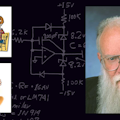Usually, I write my own columns. But recently I received a letter that was just too good to include in a "Bob's Mailbox." So I decided to make it the latest installment in my series on self-doctoring. Thank you, Mr. Kraus, for taking the time to share your hard-earned insights with our readers. /rap
Dear Bob: I had carpal tunnel, bipolar, migraines, body aches, leg cramps, and crippling prostatitis. My doctor tried to prescribe (respectively) surgery, drugs, nothing, nothing, nothing, and lots of sex. Given the progressive patterns of my symptoms—as I experienced them—I suspected a food-related systemic degenerative problem. And I wanted guidance from my doctor. My doctor would hear nothing of it, because "food intolerances are rare." But he warned me about a teensy elevation in my cholesterol.
Well, inspired by your self-doctoring articles (electronic design, Sept. 30, 2002, p. 110; Oct. 14, 2002, p. 86; April 12, 2004, p. 18), I studied food intolerances on my own. And to my joy, I have successfully treated these problems and more by eliminating any source of gluten. I used to be derisive of diets like this. Now I'm on the other end of the derision—karmic, eh?
There is a lot of public doubt on the subject. I wouldn't have believed it myself if I lacked the scientific background to read the research or keep an engineering journal of my symptoms as I tried the diet. My doctor is still cool to the idea, so I finally pestered an out-of-state friend (an MD) for support. He recently sent me this note:
"No one but one of us who has suffered from gluten intolerance can really understand what you have been through for diagnosis, or the victory you have won. Don't forget, you already diagnosed this yourself, and just asked me for information to confirm your own hypothesis. You cured yourself!
"It brings me huge joy to hear that you have healed and found more joy in your life, and are not a victim of your genetics and well-meaning but not-well-informed doctors.
"I saw a patient who I and all her doctors had thought had MS for 15 years, who was dying by inches, have a dramatic turnaround last month on a gluten-free diet. I wept that I had missed her food intolerance. You owe me nothing. You are a friend. Just be alert, and someday you can pass it forward."
Self-doctoring seems to be the rule with gluten intolerance. U.S. doctors have been taught that it is only a rare childhood disease. But 21st century research proves that gluten intolerance is very common and has many symptoms that are easily mistaken for other conditions. Gluten's strong contributions to other conditions such as diabetes and depression are only recently under study. Conventional blood tests have been recently shown by Kenneth Fine, MD, (www.enterolab.com) and others to produce more false negatives than true positives. Thus, many seriously sick patients have been told that tests show that nothing is wrong with them.
Doctors have hundreds of patients and only get the odd 15 minutes here and there to talk with you, but you are with yourself all of the time. You ought to quarterback your own health care. Lists of gluten intolerance symptoms, tips for diagnosis, and links to research papers and Celiac sites are available at www.members.cox.net/harold.kraus/gluten.htm. With sincere gratitude, Bob, for your self-doctoring essays,
Harold Kraus Jr. (via e-mail)
Pease: The occurrence of Celiac disease used to be estimated at a few ppm. Now it's recognized as around 1%. If you have symptoms, and no cause, consider a three-week vacation from gluten. Thanks, Harold. /rap
Comments invited! [email protected] —or:
Mail Stop D2597A, National Semiconductor
P.O. Box 58090, Santa Clara, CA 95052-8090
About the Author

Bob Pease
Bob obtained a BSEE from MIT in 1961 and was a staff scientist at National Semiconductor Corp., Santa Clara, CA, for many years. He was a well known and long time contributing editor to Electronic Design.
We also have a number of PDF eBooks by Bob that members can download from the Electronic Design Members Library.